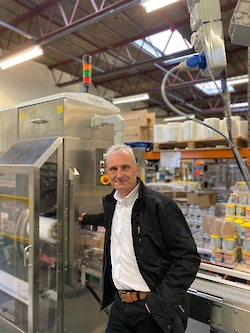Sustainable secondary packaging specialist TrakRap has made two new key appointments after a sizeable investment enabled it to pursue its ambitious growth plans.

Steve Crane has joined the company as Business Development Manager, a role that involves winning new sales opportunities and introducing TrakRap’s low carbon secondary packaging system to organisations in the Fast-Moving Consumer Goods (FMCG) industry.
Crane has held engineering and sales roles at companies in the packaging industry for more than 30 years. He joins TrakRap from packaging machinery manufacturer Adpak, where he spent 20 years as the company’s area sales manager, maintaining successful relationships with some of the UK’s biggest brands, including Asda-George and Superdry.
Packaging projects manager Amy Clark has joined TrakRap from corrugate giant Saica, where she spent three years as a design engineer whose responsibilities included managing packaging projects and materials testing.
At TrakRap, Amy will help deliver innovative and cost-effective packaging solutions to the company’s wide range of food and drink manufacturing customers, managing packaging design projects from conception to production.
Martin Leeming, CEO of TrakRap, said: “Since securing more than £1 million in investment through a Northern Powerhouse funding programme, we’ve been looking for the perfect candidates to grow our team and enable us to expand the business, so we’re delighted to have Steve and Amy on board.
“Steve’s wealth of experience in the packaging industry and proven track record of exceeding challenging sales figures will allow us to expand our customer base, while Amy’s design skills and extensive knowledge of retail markets and new materials will ensure we offer our customers the best, most cost-effective packaging solutions to meet their needs.”
The TrakRap system is a low carbon, low plastic alternative to shrink-wrapping that uses a 100% recyclable stretch film to wrap products for transit for FMCG manufacturers supplying supermarkets and retailers in the UK. The system reduces users’ carbon footprints by as much as 70% through lower CO2e emissions and significantly reduces plastic and energy consumption.



